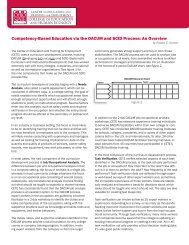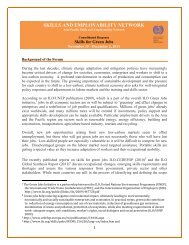FACTORS AFFECTING THE PERFORMANCE OF WOMEN ENTREPRENEURS IN MICRO ...
FACTORS AFFECTING THE PERFORMANCE OF WOMEN ENTREPRENEURS IN MICRO ...
FACTORS AFFECTING THE PERFORMANCE OF WOMEN ENTREPRENEURS IN MICRO ...
You also want an ePaper? Increase the reach of your titles
YUMPU automatically turns print PDFs into web optimized ePapers that Google loves.
male entrepreneurial ventures leaves many questions unanswered for their female<br />
counterparts. Some argue that it is important to look at female entrepreneurs who, though<br />
they share many characteristics with their male colleagues, are unique in many aspects.<br />
Observable differences in their enterprises reflect underlying differences in their<br />
motivations and goals, preparation, organization, strategic orientation, and access to<br />
resources.<br />
Birley (1987) stressed on the differences even in their background and personal<br />
characteristics. He found the female entrepreneurs to be the first born; from a middle or<br />
upper class family; the daughter of a self employed father; educated to degree level;<br />
married with children; forty to forty-five at start-up; and with relevant experience<br />
In their desire in starting new businesses, researchers identified a number of reasons for<br />
women to become entrepreneurs. South Africa Entrepreneurs Network (2005) as sited in<br />
http://www.dti.gov.za/sawen/SAWENreport2.pdf pointed out that challenges/attractions<br />
of entrepreneurship; self-determination/autonomy; family concerns – balancing career<br />
and family; lack of career advancement/discrimination; and organizational dynamics-<br />
power/politics are reported as main initiators to become entrepreneurs for women.The<br />
report also added the desire to make a social contribution and helping others has been<br />
found to be a key factor in women choosing to become business owners.<br />
2.2.2 Differences between women and men entrepreneurs<br />
While gender was shown not to affect new venture performance when preferences,<br />
motivation, and expectations were controlled for, the differences observed among men<br />
and women entrepreneurs were observed by different researchers. Among these Shane<br />
(1997) identified that men had more business experience prior to opening the business<br />
and higher expectations; women entrepreneurs had a larger average household size; the<br />
educational backgrounds of male and female entrepreneurs were similar; women were<br />
less likely than men to purchase their business; women were more likely to have positive<br />
revenues; men were more likely to own an employer firm; female owners were more<br />
likely to prefer low risk/return businesses; men spent slightly more time on their new<br />
15
















